This page contains affiliate links. We may earn money or products from the companies mentioned in this post through our independently chosen links, which earn us a commission. Learn More
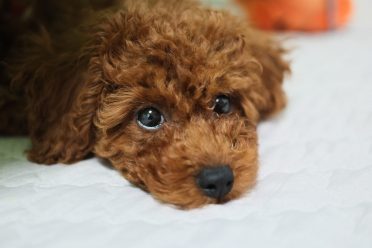 The Toy Poodle is the smallest version of the Poodle, about 9.4 to 11 inches, and a weight of 6 to 9 pounds. They share the same temperament and characteristics as the Standard Poodle. Toy Poodles are very intelligent and easy to train, not to mention their cute and adorable appearance.
The Toy Poodle is the smallest version of the Poodle, about 9.4 to 11 inches, and a weight of 6 to 9 pounds. They share the same temperament and characteristics as the Standard Poodle. Toy Poodles are very intelligent and easy to train, not to mention their cute and adorable appearance.
According to the American Kennel Club, Poodles rank seventh for popularity- and for a good reason! This breed is gorgeous both with their looks and their personality, and the Toy Poodle is certainly no different.
If you’re after a pooch with a friendly and lively temperament, then the Toy Poodle might be the perfect companion for you!
Continue to read and find out more about these beautiful creatures, from their origins to their gorgeous nature, we’ll discuss it all. Let’s dive on in!
Contents & Quick Navigation
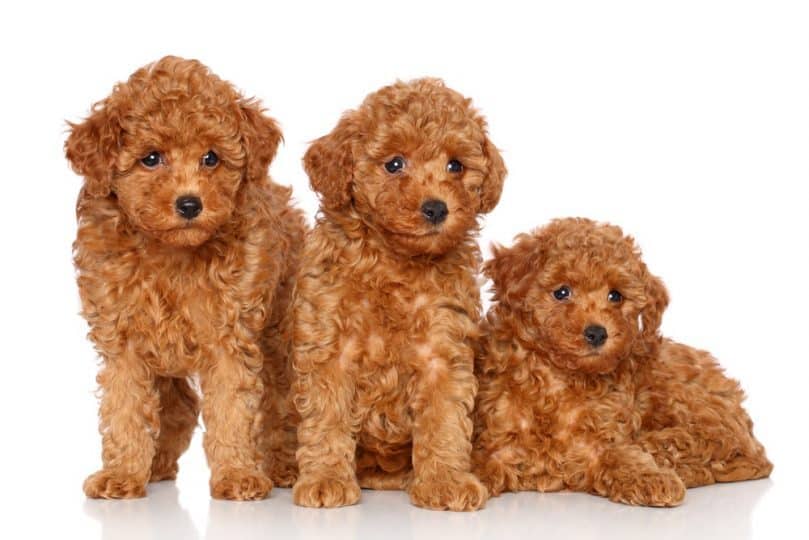
Let’s Get One Thing Straight
Before we delve into the meat and potatoes of this post, we need to set the record straight.
There’s a common misconception that all Poodles (of any kind) sport a precocious personality and don a princesses-style appearance.
However, this couldn’t be farther from the truth!
The silly clips linked with this breed don’t reflect the true likeness of this beautiful dog. Rest assured, you can groom them to look normal (in our opinion, they appear way cuter like this!).
How Did They Get Their Frou-Frou Style Reputation?
Interestingly, the ridiculous clip Poodles have become so famous for, was initially designed by hunters! They would shave off all their hair, and keep stupid poofs of fur close to their vital organs and joints. They believed this helped them move quicker and with greater ease in the water!
What is a Toy Poodle?
If you’re a Poodle enthusiast, you’ll already know that the term ‘Poodle’ refers to a group of dog breeds. This includes the Standard, Miniature, and Toy Poodles.
Poodle fits into the ‘toy’ category when its fully grown size no bigger than 11 inches (27 cm) tall (to the shoulder). Such Toy Poodle will weigh between 6 and 9 pounds (2.72 to 4 kilos).
This makes them tiny, which only adds to their cuteness!
Toy Poodles descend from retrievers (more on that later!). Therefore, their bodies reflect their athletic lineage.
Poodles are believed to come from Germany. Here they were known as the ‘Pudel’ which roughly translates to ‘splash in the water.’
This is a fitting ‘hat tilt’ to their original purpose as retrievers. They would fetch waterfowl for their owners, a task they’re still capable of doing today.
Fun Fact: Toy Poodles were initially bred to sniff out truffles in the woods, and perform in circus acts!
Toy Poodles go by a few other names, so don’t let that confuse you. They can be referred to by any of the following descriptions:
- Barboncino
- Teddy Poodles
- Dwarf Poodle
- Nano
- French Poodle
- Barbone
- Caniche
- Parti Poodle
What Are Their Coats Like?
Put simply; all kinds of Poodle grow fur that’s both a blessing and a curse.
On the upside, they don’t shed very often. This makes them an attractive choice for pet owners who suffer from allergies.
However, despite their lack of shedding, they still need grooming and bathing once every four to six weeks, and brushing each day.
Most owners hire professional dog groomers to clip their curly coats. This is because Poodles have famously tricky hair to groom. Most breeds boast two layers of fur. However, this breed only has one.
This means their hair will keep growing longer and longer without shedding, and become matted. Not only is this unsightly, but it can also trigger painful skin infections– not cool!
The Toy Poodle boasts an array of gorgeous colors:
- Blue
- Brown
- Gray
- Black
- Red
- Cream
- Silver
- Silver-beige
- White
- Apricot
In addition to theses stunning block colors, Toy Poodles have been known to showcase pretty two-tone patterns. Combinations include black and apricot, black and tan (the most beautiful in our opinion!), and white and red.
There are loads more, but we won’t bore you with an extensive list!
Other Grooming Considerations
In addition to their fur, you also need to pay attention to their nails and teeth.
Dental care: because of their small size, Toy Poodles naturally have a smaller mouth. These are renown for developing problems such as overcrowding.
Therefore, it’s even more important that you brush their teeth regularly with dog-friendly brushes and toothpaste. You should also book your pooch for frequent dental checks at your registered vet.
Nails: they’ll need trimming once every two weeks to stop them from growing too long. They’ve definitely grown too much if you can hear them clicking on the floor!
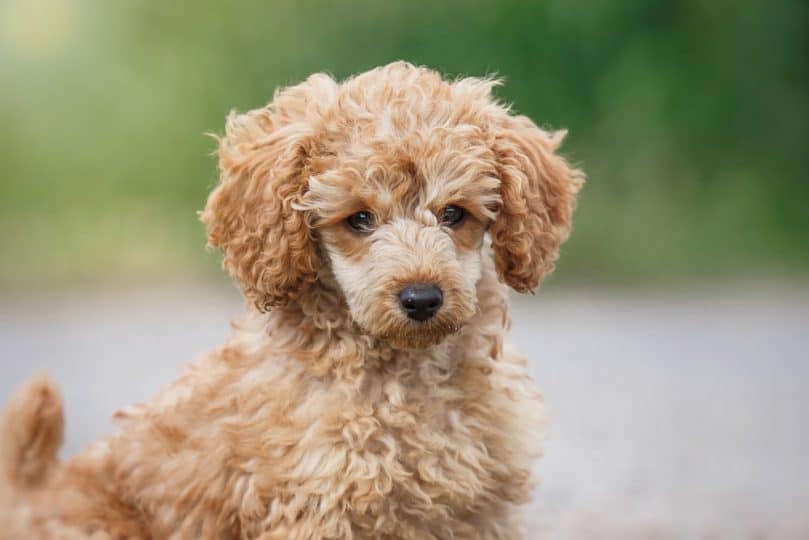
What’s Good About ‘Em?
There are loads of things that make the Toy Poodle great! Here are just a few ways they’re superior to other breeds of dogs:
#1 They’re Easy to Train
Just like their bigger cousins, they’re quick learners both in terms of tricks and housebreaking; making them an excellent choice for first-time owners, as well as fabulous guide dogs and service dogs.
They have a winning combination of intelligence and the drive to please their owners, which means dog training comes naturally to them. If you’re after a well-behaved, small-sized yet tinpet, then look no further than the Toy Poodle!
Fun Fact: Poodles are unofficially ranked second (after Border Collies) for their intelligence.
Toy Poodles are best described as tiny athletes. They’re famous for doing well in obedience competitions because they excel in retrieving (probably because of their origins). They also have a keen aptitude for obstacle courses!
#2 They’re Good with Strangers
Poodles are incredibly friendly pups, they’re usually excellent with other dogs, and traditionally even get on well with cats! If you already own another furry friend and want to introduce a Toy Poodle into the mix, it shouldn’t be too much of a problem.
Last but not least, Toy Poodles tend to show kindness to strangers. Their ability to warm to humans makes them both amazing companions and therapy dogs.
Despite being good with strangers, Toy Poodles also make excellent watchdogs. They’re alert, and usually, bark when a new person graces the driveway!
Their lack of aggression makes them beautiful family dogs too. Toy Poodles are great with kids! Their outgoing nature means they’ll happily play all afternoon- which is excellent for keeping your little ones occupied for a couple of hours!
However, because of their tiny size, you’ll need to ensure you supervise very small children when they’re around these pups. Otherwise, your Toy Poodle could get hurt. The average toddler easily outweighs this breed; meaning it’s a recipe for an accident.
#3 Toy Poodles Suit a Sedentary Lifestyle
Toy Poodles suit living more sedentary lifestyles in comparison to other kinds of Poodle. Their smaller size means they need less exercise and space to run around. They tend to be equally happy as lap dogs, as they are playing outside. Toy Poodle’s ability to quickly adapt to different surroundings makes them excellent apartment dogs.
So, if curling up on the sofa and watching TV is your thing, they’ll make an ideal addition to your household. However, you’ll still need to provide them with enough mental and physical stimulation to keep your Toy Poodle out of troubles! Activities such as indoor games, short walks, etc. should do the trick.
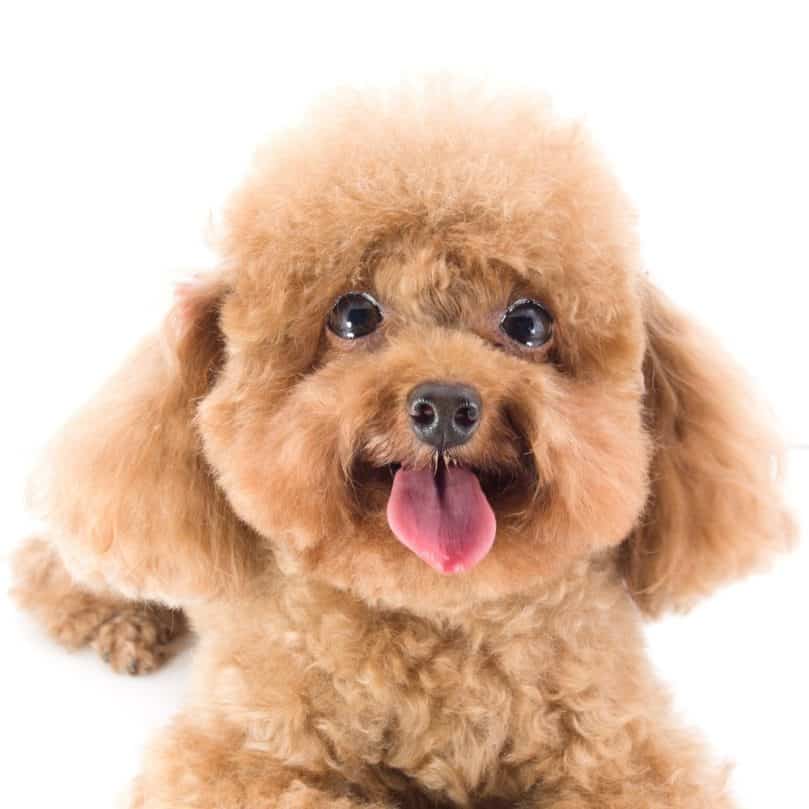
What’s Bad About ‘Em?
Despite all the fabulous qualities that make the Toy Poodle so great, you should acknowledge their downsides before committing to getting one:
#1 They Don’t Like Being Left Alone
Toy Poodles, like their cousins, don’t do very well on their own for long periods of time. They get bored and potentially destructive. Unfortunately, Poodles bark a lot. This will annoy your neighbors if you’re not there to stop it.
Poodles consider themselves more like people than dogs (which pretty much explains their intelligence), so they’ll want to be included- whatever you’re up to! If you’re unable to devote enough time to them, then they won’t be a good fit.
#2 They’re Not Massively Active
This is only a downside if you’re an outdoorsy person. Toy Poodles aren’t suited to outdoor living, so if your idea of heaven is hiking through the mountains, and going for long walks, this breed isn’t for you.
#3 Training is 100% Necessary
It would be natural to believe that because of the Toy Poodle’s sweet-natured temperament, training isn’t a big deal. Well, put simply, this is wrong.
Toy Poodles are prone to timid and nervous behavior and because of this, they need a pack leader, and that, my friend, is you.
So, like any other dog, you need to dedicate both time and effort into training them.
Are Toy Poodles Healthy Dogs?
Toy Poodles are capable of developing genetic health problems. Be sure to swot up and familiarize yourself with ailments associated with Poodles more generally, because the Toy Poodle is usually more susceptible to these diseases.
Knowledge is power. It’ll help you identify his symptoms so you can get him the medical attention he needs as soon as possible:
Blood Diseases
Blood clotting diseases are an issue for Poodles, especially, Von Willebrand’s Disease and Hemophilia.
Von Willebrand’s Disease: the most common blood clotting disorder affecting dogs, caused by their genetics. This issue occurs when your pup doesn’t have enough plasma protein to clot their blood. Sadly, this can result in extensive and severe bouts of bleeding, even from a minor cut.
This disease comes in three types (uncreatively described as Type one, Type two, and Type three). Type one is the mildest, and three is the most serious. You might not recognize the symptoms unless its a more severe case.
Things to look out for:
- Unexplained bleeding from either their mouth or nose.
- Bloody or dark tarry poops
- Blood in their urine
- Anemia
- Excessive bleeding
Hemophilia: this condition makes it hard for the blood clot, and can cause severe bleeding even via a slight injury. More specifically, this refers to an abnormal or mutated version of the ‘factor eight gene.’ This is responsible for normal blood clotting, so when it’s not working properly, your pup’s at higher risk of suffering from hemophilia.
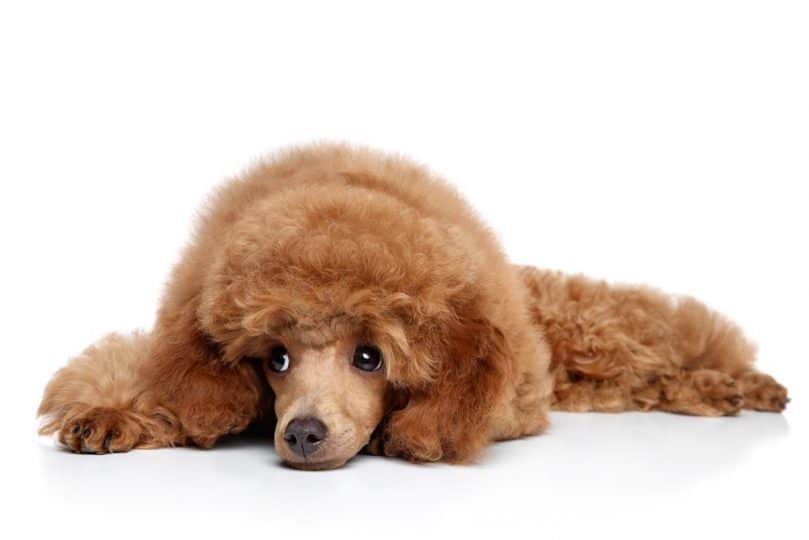
Other Common Diseases:
Epilepsy: this disease causes recurring seizures. Dogs suffering from this affliction can experience anything from infrequent and mild seizures to severe fits. Sometimes these occur relatively regularly and for long periods of time!
Deafness: the complete or partial loss of their hearing.
Diabetes: this is very similar to the diabetes humans suffer from. This condition refers to the dog’s inability to produce enough insulin or, it’s an abnormal response in the cells that respond to insulin.
Unfortunately, both these conditions stop the muscles and organs from transforming glucose into energy. This can result in excessive glucose levels in the blood, AKA hyperglycemia.
Patent Ductus Arteriosus: this condition refers to a heart defect that occurs when the ductus arteriosus doesn’t shut down at birth. This results in less blood entering their central circulation via the aorta. This means the left side of the heart has to work harder. The larger the defect, the larger the left side enlarges.
As the dog’s heart gradually gets bigger, there’s an increasing pressure on it to work even harder. This increases the likelihood of congestive heart failure, and ultimately death!
Legg-Calvé-Perthes Disease: this occurs when the top of the thigh bone doesn’t get enough blood. This triggers a gradual deterioration in the bone. If your pup’s between four to six months old and limping, this could be the cause. He might need surgery, so be sure to take him to the vet ASAP!
Sebaceous Adenitis: a complaint where the sebaceous glands become inflamed. This can result in which hair loss and other skin problems. A skin biopsy is necessary to diagnose this ailment.
Hip Dysplasia: an illness that describes a malformation in the ball and socket of the hip bone.
Eye Problems
Last but not least, we’re going move onto issues involving their eyes:
Progressive Retinal Atrophy: Just like humans, retinas in dogs are the tissues that act as the brain’s camera. Sadly, when Toy Poodles suffer from retinal degeneration, the cells in the retina don’t work as well. This can result in reduced vision, and sometimes complete blindness.
Cataracts: this refers to the cloudiness of the eye lens. This stops light transmitting to the retina, and when left untreated, can cause complete blindness.
Glaucoma: this is an issue where pressure on the eye causes poor fluid drainage. If your dog doesn’t get the treatment it needs, it’ll eventually result in long-lasting damage to the optic nerve. This can result in blindness.
Top Tip: Many of these conditions are difficult to detect in new pups. Therefore, finding a reputable breeder is of paramount importance!
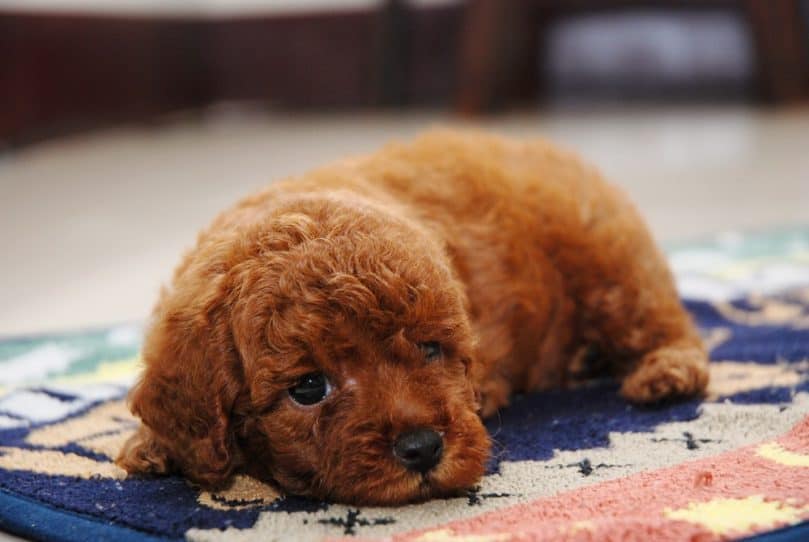
Any Advice on How to Buy a Toy Poodle?
There are a few things you should be aware of before you purchase a pup.
Be warned. You should run for the hills if your breeder does any of the following:
- Don’t offer a health guarantee.
- Claim Poodles (of any type) are 100% healthy and don’t suffer from any genetic defects
- Explain that the puppy you’ve chosen had to be isolated from the remaining litter for health reasons.
You need to find a Toy Poodle breeder who prides themselves on their honesty.
They should upfront and frank about their puppy’s health defects. They should always provide
independent certification that proves the parents (and grandparents) have been screened for common abnormalities associated with the breed.
Only then can you be sure your pup comes from healthy stock.
A buyer should get copies of the genetic tests including:
- Eye tests certified by the Canine Eye Registration Foundation.
- The all-clear for their knees by the Orthopedic Foundation for Animals.
A reputable breeder will always be more concerned about placing pups in good homes than making money. They should be happy to answer all your questions about their health and temperament. If you get the impression they want to offload the pups as soon as possible, treat them with distrust and skepticism.
If you’re after a trusted breeder, check out The Poodle Club of America, this is a good starting point.
Alternatively, if you’d prefer to rescue a Toy Poodle, be sure to check out Adoptapet.com, this is a great resource for locating the nearest adoption center to your house.
How Can I Ensure I Get an Actual Toy Poodle?
Understandably, you don’t want your Toy Poodle pup to grow as big as a miniature, or even a standard size. So we suggest doing the following to ensure this doesn’t happen:
- Choose a breeder that offers a guarantee on the adult size of their litter.
- Ask for the weight of your puppy before you commit to buying him. Roughly, whatever he weighs at 4 months, you can double. This will give you an approximate adult weight for him. If he’s only 3 months, you can triple his weight. However, the younger he is, the less accurate the forecast.
- Choose a breeder who can prove both parents are Toy Poodles (this naturally increases the likelihood of getting a Toy Poodle pup). They should pride themselves on their ethical standards of breeding and advertising. If you haven’t heard of the breeder before, try and get a few referrals to put your mind at ease.
What About the Cost?
There are a few factors that influence the price of a Toy Poodle pup: sex, the prestige of the parents, whether the puppy is a potential show dog, etc.
The average price of a Toy Poodle stands at $900. So, budget for around a grand.
For this price, you should also get the relevant papers we just spoke about. However, this doesn’t usually include breeding papers or a guarantee that the pup is ‘show quality.’
If you want a Toy Poodle puppy that boasts superior lineage and the breeding rights to your new pet, you should be prepared to part with anywhere between $3,000 and $8,000!
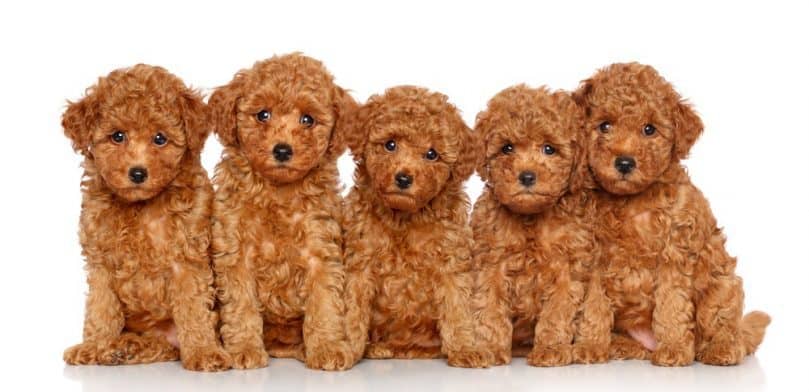
Toy Poodle Mixes
There are plenty of Breed Crosses with Toy Poodle you may like:
- Mini Bernedoodle: mix with Bernese Mountain Dog
- Peekapoo: mix with Pekingese
- Poochon: mix with Bichon Frise
- Shih-Poo: mix with Shih Tzu
- Yorkipoo: mix with Yorkshire Terrier
- Miniature Goldendoodle: mix with Golden Retriever
- Maltipoo: mix with Maltese
- Pomapoo: mix with Pomeranian
- Havapoo: mix with Havanese
- Labradoodle: mix with Labrador Retriever
- Toy Cockapoo: mix with Cocker Spaniel
- Toy Schnoodle: mix with Schnauzer
- Doxiepoo: mix with Dachshund
- Lhasa Poo: mix with Lhasa Apso
Final Thoughts
All in all, if you’re after the following, then a Toy Poodle is the perfect choice for you:
- A dog that hardly sheds.
- A pet that’s happy living in an apartment
- A pup with a playful personality that suits a sedentary lifestyle.
- A loyal companion, who’s easily trainable and gets on well with kids and other pets.
If you already have a Toy Poodle and can offer any advice for future owners, please post a comment in the box below; we love to hear from our readers. Speak soon!

Leave a Reply